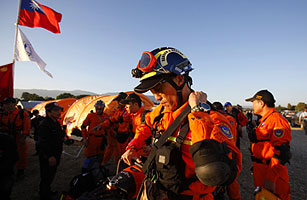
A member of Taiwan's Taipei Urban Search and rescue team prepares for deployment at the UN compound at the Port-au-Prince airport on Jan. 18, 2010
Soon after cataclysmic tremors toppled Port-au-Prince, some of the first search-and-rescue teams to depart for the devastated Haitian capital came from another small island on the other side of the globe: Taiwan. The crippling earthquake in Haiti has offered Taiwan — viewed still by the rulers of China as a renegade province and kept, as a result, in relative diplomatic isolation — a rare chance to meaningfully participate on the world stage. Taiwan has had official relations with Haiti since 1956 and is no stranger to natural disasters itself, experiencing at least two or three significant tremors a year as well the ravages of tropical storms like the 2009 typhoon that claimed hundreds of lives. For the past week, Haiti's nightmare has dominated Taiwanese news headlines and led to an outpouring of sympathy and support. A large benefit concert for Haiti is due to be held in Taipei on Jan. 24.
Taiwan's government has already pledged $5 million in aid as well as committed almost 100 tons of humanitarian relief supplies. More importantly, urged on by aid experts and figures such as France's Finance Minister, Christine Lagarde, Taiwanese officials are mulling over the possibility of helping cancel Haiti's public external debt, which was measured in 2008 at around $1.8 billion in total. According to the International Monetary Fund, at least $91 million of Haitian debt is guaranteed by Taiwanese banks, making Taipei one of the country's chief creditors — a cachet that belies Taiwan's often peripheral standing in global affairs. "We want people to know that when there is a disaster in another country ... we are willing to provide assistance," Taiwanese president Ma Ying-jeou told reporters on Jan. 20. Ma may visit Haiti while on a tour of Central America next week.
The island nation of Taiwan has cut a lonely figure in international politics for most of the past six decades. Ruled by a government that quit China in 1949 after losing its war with Mao Zedong's communists, the country still known as the Republic of China (ROC) has struggled to be recognized by the international community, with most nations opting to be on good terms with the far larger — and more powerful — mainland and ignore Taiwan's diplomatic overtures. Taiwanese representatives are kept at arm's length in international organizations and the nation is obliged to compete in sporting events under the ungainly monicker of "Chinese Taipei." Years of diplomatic outreach — mostly through an open checkbook to developing nations — have only won Taiwan official relations with 23 small countries, most of which are scattered islands in the South Pacific or the Caribbean, such as Haiti.
Taiwan has benefited, though, from a thaw in relations with Beijing since Ma came to power in a 2008 landslide election. Before, especially during the reign of Ma's firebrand predecessor, Chen Shui-bian, any assertion of Taiwanese independence or influence in foreign affairs was treated as an act of provocation on by Beijing. China actively sought to undermine Taiwan's clout even among the tiny coterie of states that favored Taipei; the Caribbean island of Dominica, for example, switched relations from Taiwan to the People's Republic in 2004 after China promised $117 million in aid over six years. In 2007, Beijing envoys attended the opening ceremony of a $40 million cricket stadium built with Chinese funds on Grenada, two years after that Caribbean nation also swapped ties with Taiwan for China. (Awkwardly for the visiting Chinese dignitaries, the anthem played in their honor by the Grenada police marching band was still that of the ROC.
This week, things have been different. After the Haiti earthquake Beijing didn't attempt to outshine Taiwan's aid commitments and even proposed coordinating relief operations in tandem with Taipei — an offer politely declined by Taiwanese officials. Since assuming power, Ma's government has taken significant conciliatory steps with his mainland counterparts, eschewing gestures deemed provocative by Beijing to boost economic links with the mainland, including re-instituting direct cross-strait flights for the first time in decades. As Ma's domestic popularity has slumped over the past year, China is keen not to make his political position any more precarious, lest it give the country's anti-Beijing opposition, once marshaled by Chen, greater traction. "Basically Beijing is now very comfortable with what Taiwan is doing [in foreign affairs]," says Loh I-Cheng, a retired former Taiwanese ambassador and veteran political commentator.
Experts say both sides want to leave behind the days when they competed across the world map for the recognition of impoverished African, Latin American and Micronesian states, often with vast sums of money that rarely effected much public good. Perhaps the most unsavory instance of these dealings was Chen's wooing of former Liberian president Charles Taylor — now on trial for war crimes at an international court in the Hague — with a 21-gun salute during a reportedly lavish state visit to Taipei in March 2001. "My goal has been to make Taiwan a country respected by the international community," said Ma in his Jan. 20 remarks. "We don't want to be accused of using 'dollar diplomacy.'"
Taiwan's role in helping rebuild Haiti is a good showcase for the nation's capabilities, blessed, as it is, with a sophisticated pool of trained scientists, engineers and doctors. As a sign of China's softening stance, last year Beijing allowed Taipei officials to attend the United Nation's World Health Organization governing body with observer status — a small victory, but a considerable one for a nation kept for decades out in the cold. "I am very encouraged by these developments," says Loh, "and do hope that this is a pattern that will repeat into the future."